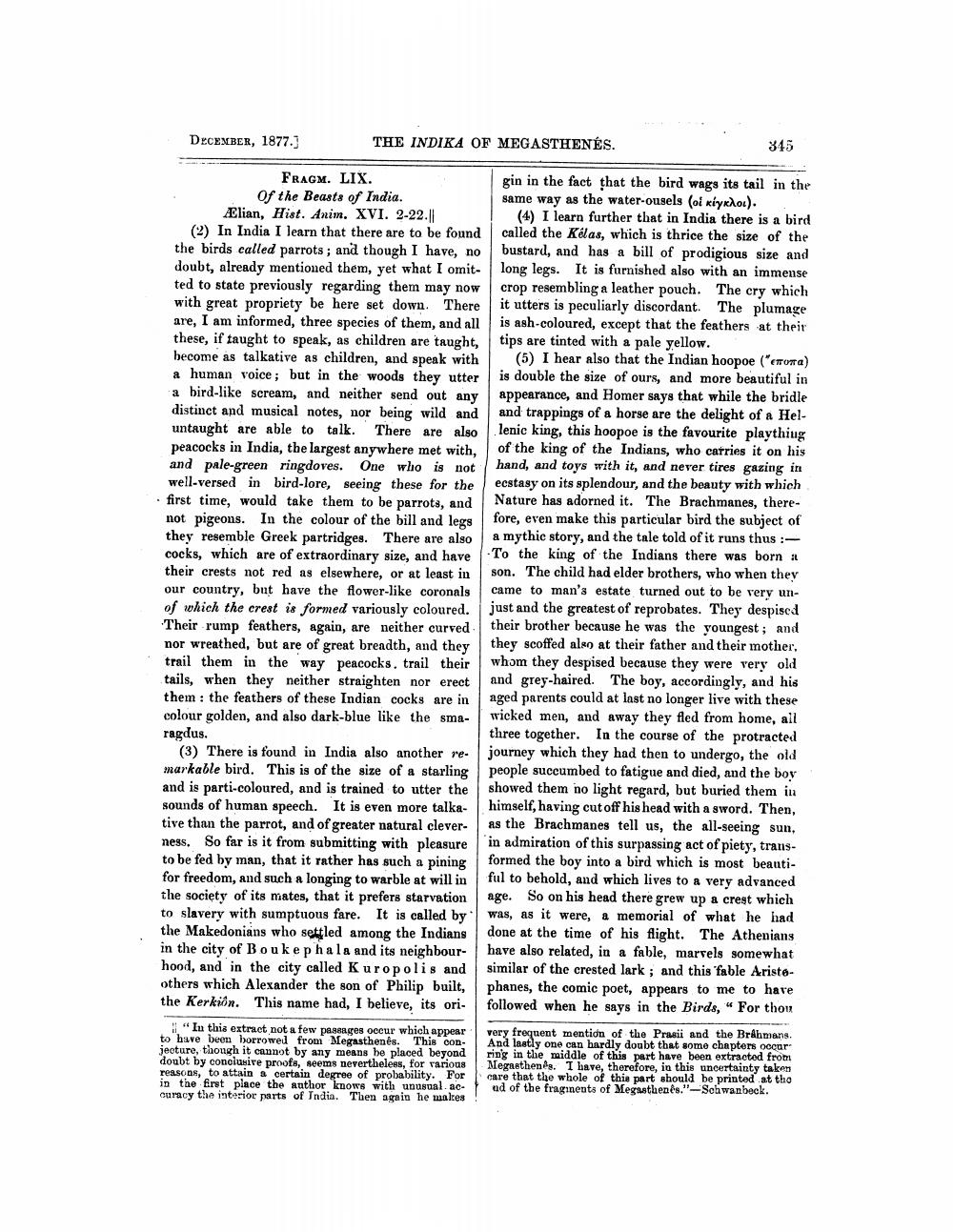________________
DECEMBER, 1877.3
THE INDIKA OF MEGASTHENÉS.
345
FRAGM. LIX.
gin in the fact that the bird wags its tail in the Of the Beasts of India.
same way as the water-ousels (ol kiykhou). Ælian, Hist. Anin. XVI. 2-22.||
(4) I learn further that in India there is a bird (2) In India I learn that there are to be found called the Kelas, which is thrice the size of the the birds called parrots; and though I have, no bustard, and has a bill of prodigious size and doubt, already mentioned them, yet what I omit- long legs. It is furnished also with an immense ted to state previously regarding them may now crop resembling a leather pouch. The cry which with great propriety be here set down. There it utters is peculiarly discordant. The plumage are, I am informed, three species of them, and all is ash-coloured, except that the feathers at their these, if taught to speak, as children are taught, tips are tinted with a pale yellow. become as talkative as children, and speak with (5) I hear also that the Indian hoopoe ("Toma) a human voice; but in the woods they utter is double the size of ours, and more beautiful in a bird-like scream, and neither send out any appearance, and Homer says that while the bridle distinct and musical notes, nor being wild and and trappings of a horse are the delight of a Hel. untaught are able to talk. There are also lenic king, this hoopoe is the favourite playthiug peacocks in India, the largest anywhere met with,
of the king of the Indians, who carries it on his and pale-green ringdoves. One who is not hand, and toys with it, and never tires gazing in well-versed in bird-lore, seeing these for the ecstasy on its splendour, and the beauty with which first time, would take them to be parrots, and Nature has adorned it. The Brachmanes, there. not pigeons. In the colour of the bill and legs fore, even make this particular bird the subject of they resemble Greek partridges. There are also a mythic story, and the tale told of it runs thus:-- cocks, which are of extraordinary size, and have to the king of the Indians there was born a their crests not red as elsewhere, or at least in son. The child had elder brothers, who when they our country, but have the flower-like coronals came to man's estate turned out to be very unof which the crest is formed variously coloured. just and the greatest of reprobates. They despised Their rump feathers, again, are neither curved their brother because he was the youngest ; and nor wreathed, but are of great brendth, and they they scoffed also at their father and their mother, trail them in the way peacocks, trail their whom they despised because they were very old tails, when they neither straighten nor erect and grey-haired. The boy, accordingly, and his them : the feathers of these Indian cocks are in aged parents could at last no longer live with these colour golden, and also dark-blue like the sma- wicked men, and away they fled from home, all ragdus.
three together. In the course of the protracted (3) There is found in India also another re- journey which they had then to undergo, the old markable bird. This is of the size of a starling people succumbed to fatigue and died, and the boy and is parti-coloured, and is trained to utter the showed them no light regard, but buried them in sounds of human speech. It is even more talka- himself, having cutoff his head with a sword. Then, tive than the parrot, and of greater natural clever- as the Brachmanes tell us, the all-seeing sun, ness. So far is it from submitting with pleasure in admiration of this surpassing act of piety, transto be fed by man, that it rather has such a pining formed the boy into a bird which is most beautifor freedom, and such a longing to warble at will inful to behold, and which lives to a very advanced the society of its mates, that it prefers starvation age. So on his head there grew up a crest which to slavery with sumptuous fare. It is called by was, as it were, a memorial of what he had the Makedonians who settled among the Indians done at the time of his flight. The Athenians in the city of Bouke p hala and its neighbour- have also related, in a fable, marvels somewhat hood, and in the city called Kuropolis and similar of the crested lark; and this fable Aristoothers which Alexander the son of Philip built, phanes, the comic poet, appears to me to have the Kerkión. This name had, I believe, its ori. followed when he says in the Birds," For thou
"In this extract not a few passages occur which appear to have been borrowed from Megasthenes. This con. jecture, though it cannot by any means be placed beyond doubt by conclusire proofs, seems nevertheless, for various reasons, to attain a certain degree of probability. For in the first place the author knows with unusual accuracy the interior parts of India. Then again he males !
very frequent mention of the Praii and the Brahmans. And lastly one can hardly doubt that some chapters oocar ring in the middle of this part have been extracted from Megasthenes. I have, therefore, in this uncertainty taken care that the whole of this part should be printed at the ad of the fraginents of Megasthenés."Schwanbeck.




